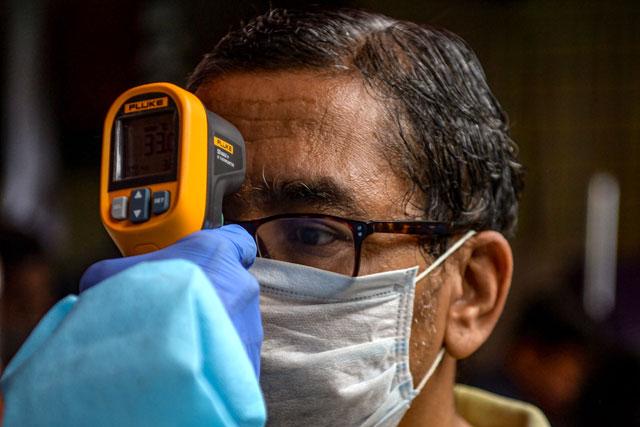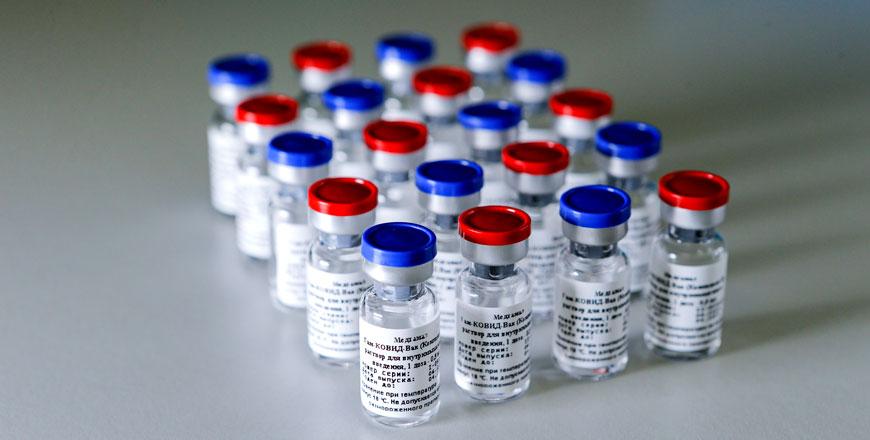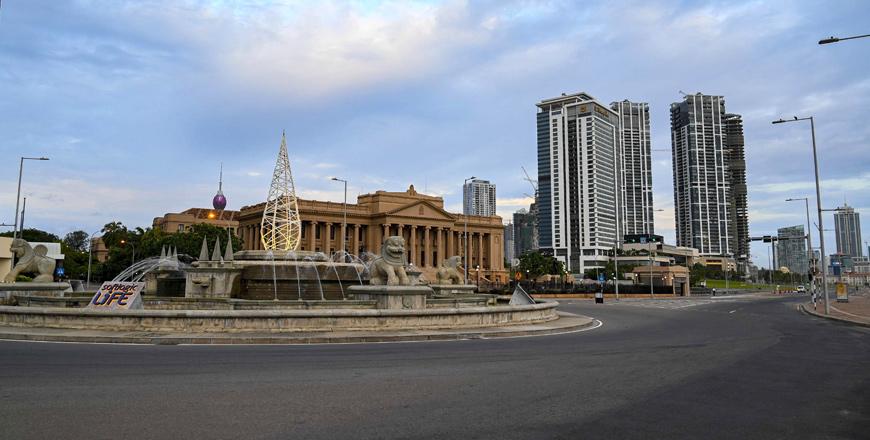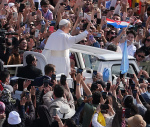You are here
Russia produces first batch of virus vaccine — ministry
By AFP - Aug 15,2020 - Last updated at Aug 15,2020
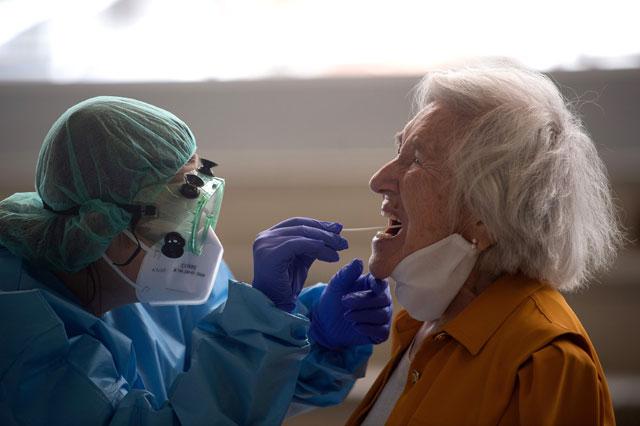
A healthcare worker collects a sample from a woman at a temporary testing centre for the novel coronavirus in Spanish Basque city of Azpeitia on Saturday following a new outbreak in the city (AFP photo)
MOSCOW/LONDON — Russia said on Saturday that it has produced the first batch of its coronavirus vaccine, after President Vladimir Putin announced it had been first in the world to approve a vaccine.
Putin's announcement on Tuesday about the vaccine was met with caution from scientists and the World Health Organisation who said it still needed a rigorous safety review.
"The first batch of the novel coronavirus vaccine developed by the Gamaleya research institute has been produced," the health ministry said in a statement quoted by Russian news agencies.
Putin said the vaccine was safe and that one of his own daughters had been inoculated, though clinical trials were not yet complete and final stage testing involving more than 2,000 people only started this week.
Western scientists were sceptical, with some warning that moving too quickly on a vaccine could be dangerous, but Russia denounced criticism as an attempt to undermine Moscow's research.
The Russian vaccine is called "Sputnik V" after the Soviet-era satellite that was the first launched into space in 1957.
It was developed by the Gamaleya research institute for epidemiology and microbiology in Moscow in coordination with the Russian defence ministry.
The head of the institute, Alexander Gintsburg, told the TASS state news agency on Saturday that volunteers taking part in the final stage testing of the vaccine's safety and efficacy would have two inoculations.
Russia has said that industrial production is expected from September and that it plans to manufacture 5 million doses per month by December or January.
Health Minister Mikhail Murashko said this week that the vaccine would first be made available to medics and would later be available to all Russians on a voluntary basis.
With more than 917,000 confirmed infections, Russia's coronavirus caseload is currently fourth in the world after the United States, Brazil and India.
Currently Russia has 92,000 people hospitalised with the virus and 2,900 in intensive care, according to the health ministry.
Countries among the hardest hit by the coronavirus pandemic unveiled further measures on Friday to battle rising infections, as the number of cases worldwide passed 21 million.
The US Department of Homeland Security said it was extending a ban on non-essential travel through border crossings with Canada and Mexico throughout most of September “to slow the spread” of the disease.
Meanwhile, Britain added France to its list of countries hit with a mandatory two-week quarantine for returning holidaymakers from Saturday, as Paris confronts a resurgent second wave of infections.
Confirmed cases in France reached levels not seen since May on Wednesday, Thursday and Friday, at over 2,500 new cases per day.
The rising threat prompted Paris police to announce on Friday that compulsory mask-wearing outside would be extended to more areas of the French capital, including the famed Louvre museum and Champs-Elysee avenue.
“If the epidemiological situation deteriorates again, mask-wearing could become compulsory throughout the capital,” Paris police warned, also banning gatherings and protests of more than 10 people which do not comply with distancing measures.
Neighbouring Spain said it would close all nightclubs and ban smoking in the street where people are unable to stay at a safe distance, after the country reported almost 3,000 cases in 24 hours on Thursday.
“Personally I think it’s stupid, it’s over the top,” Madrid-based translator Julien Garcia told AFP about the smoking ban.
In Germany, the Robert Koch Institute for disease control added all of Spain except the Canary Islands to its list of regions where incoming travellers must show a negative test for COVID-19 or quarantine for 14 days.
Austria urged its citizens to return from popular Mediterranean destination Croatia before similar rules come into effect on Monday, while Serbia introduced mandatory testing for travellers from four neighbouring countries.
And thousands of Albanians queued in their cars at the Greek border, hoping to squeeze across and return to work before tougher entry requirements designed to brake mounting infections come into effect.
Some people had been waiting for three days in the 20-kilometre, 4,000-car jam, an Albanian police source said.
Around the world, the number of confirmed COVID-19 cases passed 21 million on Friday according to an AFP tally from official sources, with more than 755,000 fatalities.
The United States has suffered the most deaths at 168,318, followed by Brazil with 105,463, Mexico 55,293, and India with 48,040.
Cross-Channel scramble
France and the Netherlands have now joined Spain and several other European nations on Britain’s quarantine list, having at first been granted exemptions.
French student Antoine, 23, had to rush back to Bristol, where he is at university, cutting short his summer holidays.
“I’m a waiter in a small cafe near college, I can’t afford to spend 14 days in the house,” he said at London’s St Pancras railway station after getting off a Eurostar train.
French holidaymakers in the UK will be faced with tough choices of their own, as Paris swiftly announced a “reciprocal measure”, although it was unclear when that might be imposed.
The Netherlands said it would advise against all but essential travel to Britain, but will not impose a quarantine of its own for incoming travellers.
A slew of data Friday revealed the scale of the economic impact of the virus and punishing lockdowns, with Hungary, Bulgaria, Romania, The Netherlands, Finland and Denmark all booking hefty hits to GDP in April-June.
“Never before” has the Dutch economy suffered shrinkage of 8.5 per cent in a single quarter, the CBS statistics office said, while Denmark and Hungary both reported their worst slumps since the early 1990s.
Central European heavyweight Poland entered its first recession since the end of the communist era.
Related Articles
MOSCOW — Russia said on Tuesday it has developed the world's first vaccine offering "sustainable immunity" against the coronavirus, despite
MOSCOW — Russia claimed on Tuesday that it had developed the world's first vaccine offering "sustainable immunity" against the coronavirus,
GENEVA — The World Health Organisation (WHO) issued a grim warning on Friday that the second year of COVID-19 was set to be "far more deadly


